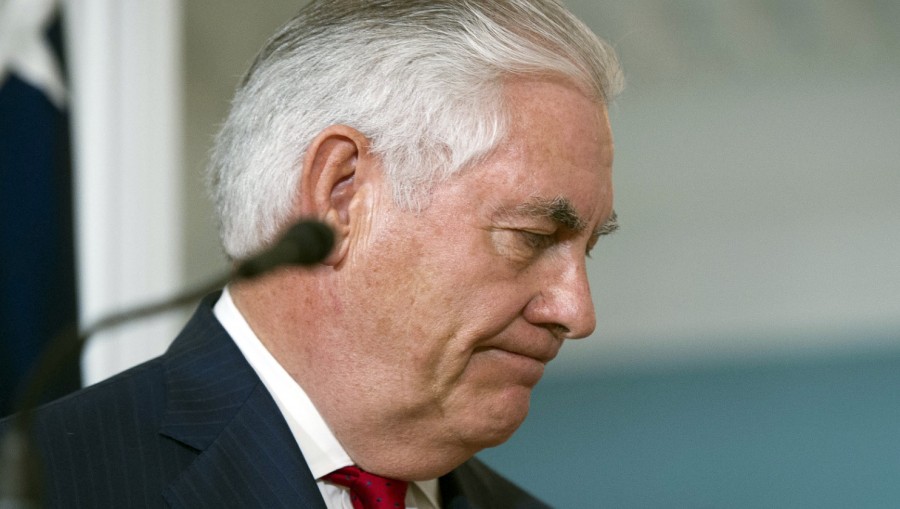“Mr. Charisma,” as Rex Tillerson was sardonically dubbed by Vox News’ Yochi Dreazen, is on his way out of the Trump Administration.
Mr. Tillerson earned his nickname for a significant lack of presence. As Secretary of State, he was known for being inconspicuous.
On his first visit to Asia last March, Tillerson broke tradition by inviting one journalist, Erin McPike of the Independent Journal Review, instead of press corps. The State Department Correspondents Association announced their disappointment at the secretary’s choice in a statement.
Indira Lakshmanan, a columnist for the Boston Globe and veteran of the State Department press corp was also surprised by his avoidance of media attention.
“My first reaction is that it’s very troubling. Now, it is understandable on the one hand that he might not be so comfortable doing press meet and greets at the beginning,” said Lakshmanan while Tillerson was on his diplomatic trip abroad. “He didn’t come to this role as a politician or senator as many other recent secretaries of state were.”
His background is in the oil industry. Tillerson worked his way through the Exxon Corporation, eventually becoming the chairman and CEO of ExxonMobil in 2006, a position he held until accepting his nomination as Secretary of State.
Despite his political inexperience, Tillerson was touted for the position of chief diplomat by Washington insiders. Among his top proponents were Robert Gates, who served as Secretary of Defense for both Presidents George W. Bush and Barack Obama, and Condoleezza Rice, President W. Bush’s Secretary of State during his second term.
Throughout his tenure, Tillerson maintained that he was not accustomed to the ways of Washington. In an interview given to the Independent Review Journal on March 22, he indicated that he did not have an extensive political agenda.
“I didn’t want this job. I didn’t seek this job. My wife told me I’m supposed to do this,” he admitted.
Even so, the secretary approached his role with some key ambitions. Tillerson wanted to increase efficiency within the State Department’s Harry Truman Building and save the State Department $10 billion over five years. His efforts at efficiency, however, do not explain the many vacancies in high-level State Department offices that had not been filled by the time of Tillerson’s announced departure.
According to Bloomberg Politics, eight of the top ten State Department positions are vacant. The foreign service, a main responsibility of the State Department, is also understaffed.
Additionally, the Trump administration has yet to name an ambassador to South Korea. During times of diplomatic crisis, such as nuclear posturing by North Korea, the ambassador is a vital player in talks and negotiations.
As Secretary of State, Tillerson repeatedly suggested that President Trump tone down rhetoric on North Korea and opt for diplomatic measures.
On October 1, the president tweeted, “I told Rex Tillerson, our wonderful Secretary of State, that he is wasting his time trying to negotiate with Little Rocket Man…Save your energy Rex, we’ll do what has to be done!”
Days later, on October 4, NBC News reported that officials close to the administration heard Rex Tillerson refer to the president as a “moron.” The New Yorker confirmed the same incident, but their sources say that Tillerson called the president an “[expletive] moron.”
In response to the incident, President Trump told Forbes magazine, “I think it’s fake news, but if he did that, I guess we’ll have to compare IQ tests. And I can tell you who is going to win.”
The White House spokeswoman, Sarah Huckabee Sanders, said that the president’s comment was a joke.
By November, reports surfaced that the White House Chief of Staff, John Kelly, was planning to have Tillerson leave his post. Arkansas senator, Tom Cotton, and UN Ambassador, Nikki Haley, were both considered for the role, in addition to CIA Director, Mike Pompeo. Despite these rumors, Rex Tillerson remained Secretary of State in January and he told CNN that he expected to continue in his office for all of 2018.
Another significant rift did not occur until earlier this month. On March 8, a visiting South Korean envoy extended the North Korean offer of a face to face meeting between President Trump and North Korean leader, Kim Jong-un. President Trump accepted the offer eagerly, without consulting with his advisors. Rex Tillerson was not present for the decision.
The following day, while traveling in Africa, Tillerson told reporters that talks with North Korea would not happen, as the diplomatic conditions were not right. He urged clarity, realism, and even preliminary talks before engaging North Korea in nuclear negotiations. The next afternoon, President Trump announced that he would move forward with talks and intended to meet with Kim Jong-un before May.
From Djibouti, Tillerson said, “In terms of the decision to engage between President Trump and Kim Jong-un – that’s a decision the president took himself.”
The same day, John Kelly called Tillerson and told him to be mindful of the president’s Twitter feed, as there may be a tweet of particular interest to him in the upcoming days. Tillerson cut his Africa trip short, and returned to Washington.
Three days later, on March 13, the Washington Post reported Tillerson’s firing which was confirmed by a Trump tweet minutes later. In the same tweet, Trump announced that CIA Director, Mike Pompeo, would become the Secretary of State and the Deputy Director, Gina Haspel, would become the Director of the CIA. Tillerson says that he learned of his termination via Twitter and was not called by the President until noon, nearly three hours after the tweet was sent.
The White House says that Tillerson was removed to better prepare for upcoming talks with North Korea with Pompeo at the helm. Pompeo has widely been considered an effective manager of the CIA.
In a speech from the State Department’s press briefing room, Tillerson declared that he would remain at the State Department until March 31 to finalize administrative matters, while his deputy, John Sullivan, would become the acting secretary between the transition from Tillerson to Pompeo.
Throughout his farewell speech, Tillerson condemned Russia, expressed hope regarding North Korea, and advocated for stability in Syria. He thanked US allies in a tacit proclamation of globalism, the US people, and State Department staff. Rex Tillerson noticeably did not thank President Donald Trump.
Featured photo courtesy of NPR.














![The team hoists the state championship trophy together. After winning the program's first state title in 2023, the girls volleyball team finished the 2024 season with a perfect 20-0 record, a county championship, regional championship and state championship. “One thing [us seniors] really preach is building that family and that community,” Djordjevic said. “I hope that the legacy we leave is one that demonstrates the strong bond we have and how crucial that is to a successful team and to a successful game like this.”](https://thermtide.com/wp-content/uploads/2025/02/DSC_1078-2-1200x800.jpg)



